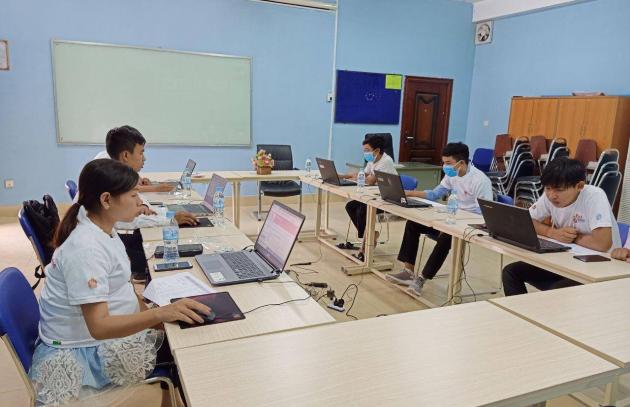119237764_3978241118869139_8958654759776305480_o.jpg

Over the past six months, online learning has become the norm the world over. This has been no exception in Cambodia, where all schools are set to re-open by November. However, education officials also knew that they would need to diversify learning options if they were to reach as many learners as possible during the height of the COVID-19 pandemic.
“We have internet in the cities and town, but in the countryside and remote areas we have no internet. Students in these areas cannot study online, so we created a strategy to bring online learning to televisions, and other platforms. We would bring the teachers to the studios to create videos,” says Sivutha Onn, the Director of the Planning Department at the Ministry of Education, Youth, and Sports in Cambodia.
As a result, students from pre-school to upper secondary could tune into TVK2, a Cambodian television station launched during the pandemic. Grade nine through 12 students became a priority for online learning ahead of national examinations, and the Ministry provided pre-recorded lessons for all grade levels on its Facebook page, YouTube channel, and e-learning website. Learners could also follow learning programmes via Telegram, Zoom and Google meetings, and as well as Multilingual Education and Cambodian sign language online and on television.
COVID-19 fast-tracked digital education in Cambodia. However, the digital divide meant many learners in remote areas lost precious learning time. A capacity development exercise, with technical support from IIEP-UNESCO, strives to create a strong foundation for the advancement of educational goals.
While this variety definitely helped fill learning gaps during the COVID-19 pandemic, Cambodia’s digital divide remains a major challenge. Children from poorer households and those in remote parts of the country struggled to access distance learning: A rapid assessment led by the Ministry found that only 24% of primary grade students had access to e-learning on television and 22% had access via Facebook during the pandemic.
Nevertheless, digital education in Cambodia is not going anywhere. While it accelerated during COVID-19, this is actually a major priority area for educational development. It also has strong links with Cambodia’s ambitions for a digital economy and its goal to become a middle-income country by 2030.
Here are three areas for the expansion of digital learning:
- Develop digital infrastructure: Digital infrastructure is a requirement for Industry 4.0 – a new phrase for the industrial revolution that relates to digital technology and automation. Getting students ready for this starts with education for the 21st century and major investment in modern infrastructure. To advance on this, the government has outlined eight steps in its current Education Strategic Plan. Some of these include adopting new management and administrative processes to increase efficiency, transparency, and effectiveness of governance, creating standards for infrastructure and network connections at national and sub-national levels, and cooperating with private companies that focus on digital technology, among other initiatives.
- Boost capacities for training: Teachers are key to creating a digital generation of students. “The priority must be teachers, and we have to improve their capacity to provide digital education and this starts with better teacher training,” explains Onn. Cambodia has also taken major steps to improve teaching conditions, including raising the minimum salary to around $300 US dollars a month, a threefold increase since 2014. Beyond teachers, the entire education administration also needs to be better equipped and trained to be able to work digitally. In addition, Anna Haas, a programme specialist at IIEP-UNESCO, explains that the foundation of the education system must first be ready before providing relevant teacher training and digital education: “We need to look at what is happening in the background – and ensure management and leadership has the capacity – before looking at the frontline, and service delivery,” Haas says
- Adapt content and curriculum: Once the administrative capacity is ensured, Onn says that the focus can turn to properly adapting the content for digital channels. “Currently the curriculum and educational content is on ‘paper’ and this needs to take a digital form,” he says.
Next steps for going digital
Digital education is part of many education goals in Cambodia today, from higher education reform to making stronger links with the world of work. It can also contribute to resilience building in the education system – which the COVID-19 pandemic highlighted. As Cambodia develops its latest Capacity Development Master Plan – an important component to helping achieve educational goals laid out in the country’s Education Strategic Plan – digital education is likely to become a permanent fixture.
What is Cambodia’s Capacity Development Master Plan (CDMP)?
The CDMP 2019-2023 responds to the policy objectives of its current education plan for 2019-2023. While it is still in development, it will cover the capacity development of the entire Ministry, from the institutional level down to the individual. It will outline what is required of the Ministry to ensure effective leadership and management of education staff and address existing capacity constraints for achieving Cambodia’s long-term vision for education. IIEP-UNESCO is providing the strategical framework for this, as well as helping assess the quality of the CDMP and facilitating consultative workshops.





